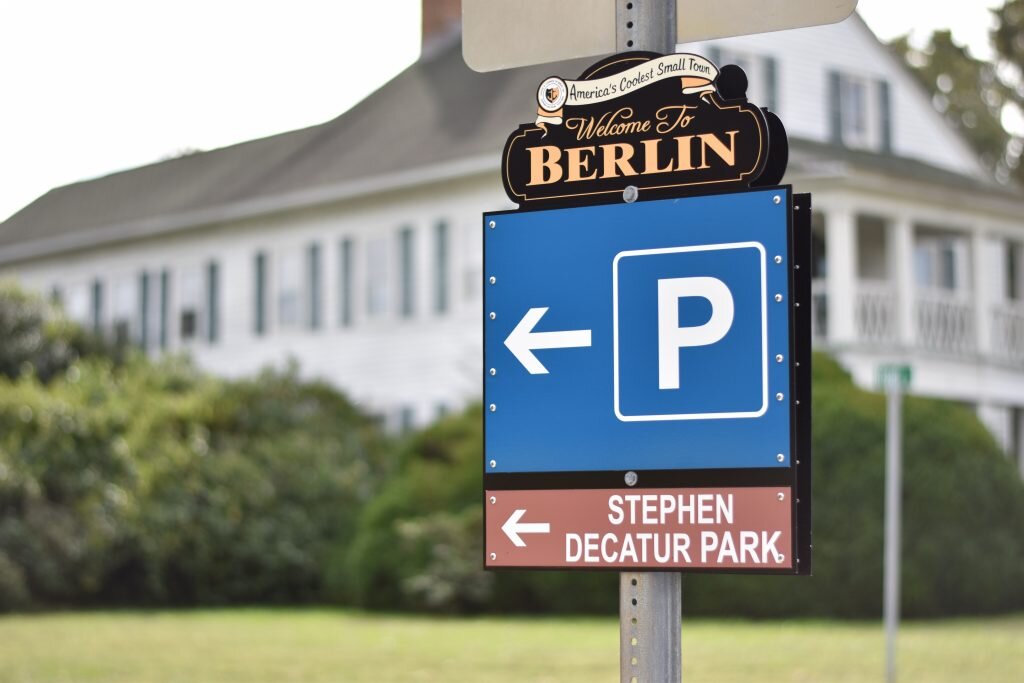Problems identified and solutions recommended but money unavailable

JOSH DAVIS/BAYSIDE GAZETTE
Signs downtown point to public parking in Berlin. The Town Council approved funds for a new parking and mobility study in Berlin last year
(Aug. 8, 2019) The next steps to address parking concerns in Berlin may be indefinitely delayed for financial reasons, but a study given to Berlin’s Town Council earlier this year provided some guidance.
Berlin’s Town Council in October 2018 approved spending roughly $26,000 with the consulting firm, Sabra and Associates, of Columbia, Maryland, for a study of the town’s parking situation. Findings were returned to town officials in February 2019.
The parking inventory compiled by the firm listed 146 curbside parking spots across downtown. A breakdown of those showed 94 unrestricted spaces, 50 two-hour spots and two handicapped spaces.
The inventory also showed that the town has 518 off-street parking spaces, with 132 in public parking lots, 213 in private parking lots and 173 spaces in “Lot A,” a large lot just off Main Street by Fins Ale House.
The study embraced the area from Route 113 to the Maryland-Delaware Railroad line and the Berlin branch of the Worcester County Library. The study also reached Berlin Falls Park to the north and Buckingham Lane to the south.
However, analysts stressed the importance of being strategic with the town’s decision to add additional spaces at some point.
“Providing too much or poorly placed parking can be immensely costly, increase vehicle traffic, reduce pedestrian and cyclist safety, and reduce development density,” the study stated.
Brian Laverty, project manager and senior transportation manager, was charged with assessing the availability of parking. He conducted several interviews with churches, businesses, property owners, the town’s chamber of commerce, as well as town officials and committees.
They offered insight on some of the parking problems the town faces, including increased development, employee parking, and whether to implement an additional parking garage.
Laverty conducted field observations and gathered data over three days during Berlin’s secondary tourist season in November and December 2018.
Nov. 23, 2018 was the annual tree-lighting ceremony, a heavy traffic day in town.
Consultants found on Nov. 23 that “downtown parking supply is in fact overextended during major town events, with the downtown parking lots filled beyond capacity in aggregate immediately before and after the tree lighting.”
Additionally, consultants tracked congestion across the town’s five lots and found capacity peaked at 106 percent around 5:45 p.m.
Nov. 24, 2018 was “Small Business Saturday,” which represented a holiday shopping day in town. It was similar to the previous day with one major difference: weather.
Heavy rains soaked the town during the mid-afternoon hours, but lots were at 85 percent capacity by 12:15 p.m., according to the study.
Consultants deemed Dec. 13 “a typical shopping day during peak season” in Berlin, but they said it was different than the previous holiday weekend with lots peaking at 81 percent capacity by 2 p.m. on that Thursday.
Consultants also observed on Nov. 24 and Dec. 13 there were “a considerable amount of vehicles parked in same spot for an overextended amount of time.”
The average amount of time was nearly four hours, the study found.
Sabra and Associates offered a number of recommendations for Berlin, including curbside management, pricing and enforcement and shared use agreements.
Consultants suggested including spaces for an Uber and Lyft drop-off and pick-up stations for people coming in from Ocean City to frequent Berlin’s shops and eateries during peak times, which include Monday through Saturday 4-10 p.m., according to the study.
Additionally, businesses receiving shipments could designate loading spaces from 5-11 a.m.
As for parking management, Sabra and Associates said Berlin could implement a low cost mobile app parking enforcement option. Drivers would pay $1 per hour with a two hour maximum for designated spaces on Main Street, Pitts Street, Commerce Street, and Jefferson Street, according to the study.
The town doesn’t enforce the two-hour spaces to “appear tourist friendly,” according to the study.
Berlin’s Town Administrator Laura Allen had already observed that the town had a “parking management problem” because sometimes area business owners and employees would park at “high trafficked areas” for longer periods of time.
That could put visitors at a disadvantage, because they may not know where alternative parking solutions are, the study said.
“In effect, local residents, specifically downtown business owners and employees, are given priority over prime parking spaces at the expense of local visitors that are crucial for the town’s tourism industry,” the study found.
Other options include having shared use agreements with downtown churches and a potential permit system. Or a shared valet parking initiative between the Town of Berlin and Berlin’s Chamber of Commerce, according to the study.
Consultants also looked for ways to increase additional parking spots by contacting private property owners and propose selling or leasing land near downtown. Redrawing lines within the existing “Lot A” could also add more spaces.
Additionally, creating a mobile-friendly parking website could also spread awareness of options in town, according to the study.
Consultants also stressed the importance of completing Berlin’s Rail trail, which would run eventually connect downtown to the firehouse and Berlin Falls Park.
They study went onto state that “implementing the planned trail and eventually connecting it to bike corridors in the region should be a high priority.”
As for a continued examination, Berlin’s Town Administrator Laura Allen cited financial reasons for halting the work.
However, Allen said the mayor and council would discuss the possibility of progressing with the second phase of the study in an upcoming budget cycle if funds were available.
“We don’t have money in the budget to complete the second phase of the study, and there’s not funding in the budget to pursue a parking solution that involves any kind of investment or any kind of expense,” Allen said last month.
